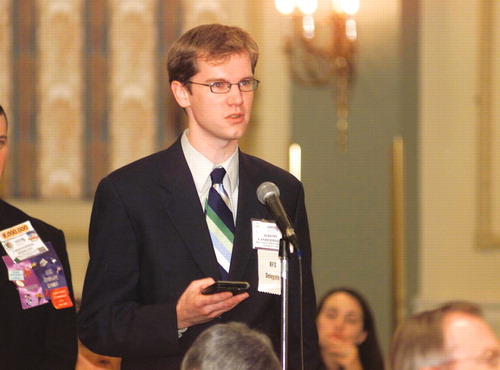AMA to Develop Guidelines On College MH Care

The AMA will advocate for developing guidelines on appropriate access to psychiatric and other mental health services on college campuses, as part of a comprehensive report the organization has agreed to prepare on depression and suicide on college campuses.
The AMA House of Delegates last month approved a resolution calling for the report, which will include a review of scientific data on the efficacy of prevention programs aimed at reducing the incidence of suicide on college campuses. The AMA has also agreed to review the data on access to—and utilization of—college mental health services.
The resolution was brought to the house by APA, the American Academy of Child and Adolescent Psychiatry, the American Academy of Pediatrics, and the American Academy of Psychiatry and the Law.
The AMA action is a victory for APA's own initiative to address depression, suicide, and other mental health issues on college campuses. In January, Michelle Riba, M.D., then APA president, established the Presidential Task Force on Mental Health on College Campuses, one goal of which was to bring the issue to the attention of the AMA (Original article: see box).
Task force co-chair David Fassler, M.D., AACAP's delegate and a member of the Section Council on Psychiatry, told delegates at the meeting that psychiatric illness is increasingly prevalent on college campuses.
“The incidence of significant psychiatric illness, including depression, is increasingly common on college campuses, in part because we are doing a better job of recognizing the signs and symptoms of mental illness at an earlier age,” Fassler said. “As a result, more and more young people are coming to college with an existing diagnosis. Some of those young people may not have made it beyond high school in previous generations. The ability to attend college is due in part to early and effective psychiatric treatment.
“We now have close to 16 million college students, and more of these young people need access to comprehensive mental health care, including psychiatric and substance abuse services,” Fassler said.
Jeremy Veenstra-VanderWeele, M.D., a resident member of the Section Council on Psychiatry, testified about his own experience as a “dorm parent” working the night shift at the University of Chicago.
“There really is a sense of panic on college campuses about suicide,” he said. “The staff members take very seriously any indication for suicide without any knowledge of what to take very seriously and what to take somewhat seriously. I think our AMA could use its medical knowledge to provide guidance to college staff members who lack our level of clinical training.”
Veenstra-VanderWeele added that parents of new college students may not ask about the availability of mental health services on campus or inform staff that their children have been receiving such services, making continuity of care difficult or impossible.
“There really is no clear way to transition these kids into college and into treatment within the new community they are a part of,” he said.
“Depression and Suicide on College Campuses” is posted online at<www.amaassn.org/meetings/public/annual05/425a05.pdf>.▪



